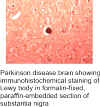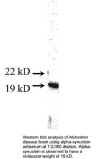The
a-synuclein
gene was discovered on chromosome 4 and is responsible for early-onset
autosomal dominant Parkinson's disease (PD).
It is an abundant protein whose major site of expression is in the
nervous system. Human "-synuclein
is also known to be a precursor of the non-b-amyloid
component protein of Alzheimer's disease where one of its fragments
associates with amyloid deposits. The
function of this gene product is currently unknown, but it is being shown
to be associated with other neurodegenerative diseases, such as dementia
with Lewy bodies and multiple-system atrophy.
A
goat antiserum to a synthetic peptide that corresponds to amino acids
116-131 of the C-terminus of human a-synuclein
protein is currently available. This antiserum has been shown to
be
immunoreactive with the unconjugated immunizing peptide by ELISA. This
antibody has been shown to immunolabel Lewy bodies in PD brains using
formalin-fixed, paraffin-embedded sections.
This antibody should be a valuable tool for scientists working to
understand the role of a-synuclein
in PD.
available. This antiserum has been shown to
be
immunoreactive with the unconjugated immunizing peptide by ELISA. This
antibody has been shown to immunolabel Lewy bodies in PD brains using
formalin-fixed, paraffin-embedded sections.
This antibody should be a valuable tool for scientists working to
understand the role of a-synuclein
in PD.
 This
antiserum was produced using proprietary methodology whereby the peptide
is attached to a carrier that elicits minimal immunoreactivity so that the
antiserum has a higher degree of specificity for the peptide.
Since there is no overwhelming production of interfering antibodies
to the carrier, this antiserum can routinely be used without further
purification. Pseud-Immune™
control
immune serum (Cat no. GPA018E) from a mock immunized animal is available
to be used in conjunction with this antibody as well as the immunizing
peptide (Cat no. HSP009C), which can be used to neutralize
immunoreactivity.
This
antiserum was produced using proprietary methodology whereby the peptide
is attached to a carrier that elicits minimal immunoreactivity so that the
antiserum has a higher degree of specificity for the peptide.
Since there is no overwhelming production of interfering antibodies
to the carrier, this antiserum can routinely be used without further
purification. Pseud-Immune™
control
immune serum (Cat no. GPA018E) from a mock immunized animal is available
to be used in conjunction with this antibody as well as the immunizing
peptide (Cat no. HSP009C), which can be used to neutralize
immunoreactivity.
Manufacturing
Reference:
Spillantini, M.G., et al.
Nature 388:839-840, 1997.
 Polyclonal Anti-human
Polyclonal Anti-human